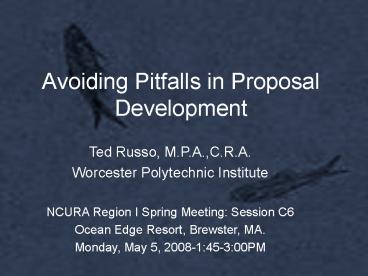Avoiding Pitfalls in Proposal Development PowerPoint PPT Presentation
1 / 18
Title: Avoiding Pitfalls in Proposal Development
1
Avoiding Pitfalls in Proposal Development
- Ted Russo, M.P.A.,C.R.A.
- Worcester Polytechnic Institute
- NCURA Region I Spring Meeting Session C6
- Ocean Edge Resort, Brewster, MA.
- Monday, May 5, 2008-145-300PM
2
The Funding Environment
In an increasingly competitive funding
environment, what can we do (or not do!), to help
our customers to be successful?
3
The Role of the Research Administrator in
Proposal Development
- Facilitator
- Negotiator
- Hand-Holder
- Problem-Solver
- Intermediary
- And many, many, others
4
Returned without Review Three words a Research
Administrator never wants to see!
- Compliance isnt just for post-award!
- Some examples of returned proposals
- PI didnt address management plan.
- Collaborating institution uploaded abstract
twice. - PI missed deadline. Was verbally told by PO he
was OK to submit on the following Monday. Not so
much. - PI/ORA didnt follow instructions on MOU.
5
The Role of the Research Administrator in
Proposal Development
- But..its not just about getting the proposal
past a compliance screener! - We are, and should be so much more than budget
builders, if were going to add real value to
the proposal.
6
The Role of the Research Administrator in
Proposal Development
- The main contributing factors to a poorly
written, disorganized, non-compliant proposal - Lack of TIME
- Lack of ORGANIZATION
- Lack of COMMUNICATION
7
Its about the Science! Adding Value, Managing
TIME
- Clear statement of Institutional Policies on
timeline for Proposal Development and Submission. - Convince PI that you can add value to the process
if given sufficient time.
8
Its about the Science! Adding Value, Managing
TIME
- Adding Value - Some examples
- Title, Abstract and Narrative Review
- Is the title too long? Awkward? Wordy?
- Typos/Spelling/Grammatical errors can be
proposal killers. - Address relevant review criteria?
- Are abstract, narrative well written,
organized/structured? Not one long run-on! - NSFs suggested use of Third Person.
9
Its about the Science!Adding Value, Managing
TIME
- Adding Value A few more examples
- Budget as a Fiscal Expression of project.
- Is there a disconnect?
- Is the budget narrative adding value? Use the
extra page length to bolster credibility as a PI,
team! - The suggested reviewers conundrum.
10
The Speedster in all of us.
- Some Time Savers
- Multiple submissions? Writing to the group.
- Technology is your friend! (No, really..stop
laughing.) - Solutions for Grants.Gov implementation.
- WPI shared network drive.
- Adobe, Adobe, Adobe!
- Helpful third party software. Eg Back-converters
like ABBY PDF, free tools such as Slick Run,
and PS Hot Launch.
11
What do you do when there IS no TIME?
- What can you realistically do, given the time?
- Look for the Quick Fix.
- Making the Call Will the proposal harm the PI
and/or institutions reputation?
12
The Importance of being ORGANIZED
- Kickoff meeting with pre-award staff? What can
you do to help? - Encourage PI to contact sponsor.
- 80 of successful proposals are initiated with
some degree of sponsor contact. - Where there is vagueness, do NOT hesitate to
contact sponsor!
13
The Importance of being ORGANIZED
- Getting your Ducks in a Row
- Institutional and Federal Forms PRIOR to
submission. - Who, What, When and Where?
- WPI NOI Electronic Web-Form.
- Careful Review of Program Solicitation
- Eligibility
- Deal-Breakers?
14
The Importance of Being ORGANIZED
- Getting your Ducks in a Row (continued)
- Collaborative Proposals Make contact ASAP!
- Traditional or Linked?
- LOI, SOW, Budget, Budget Narrative, IDC Rate
Agreement. - Provide synopsis of requirements for more
complicated/complex submissions?
15
The Art of Effective COMMUNICATION
- Brevity
- Clarity
- Organization
- Tone
- Above all, listen.
16
The Art of Effective COMMUNICATION
- One size does not fit all Know your audience
- Be positive.
- Coaching towards a successful submission.
- Direct without micromanaging. Pick and choose
your battles carefully. - Suggest Use words, like might and should,
rather than have. - Remind, but dont nag.
- Reinforce-if something looks great, let them
know! A little encouragement goes a long way!
17
The Art of Effective COMMUNICATION
- One size does not fit all Know your audience
- New vs. Old School.
- Encourage less experienced PIs to approach
colleagues for feedback. Formal/informal
mentorship program? - Old Schoolers tend to be more impatient with
Fastlane, Grants.Gov.
18
CONCLUSION
- Think like a compliance screener and reviewer.
- Be Proactive in your approach. (Rather than
Reactive.) - Never lose sight that its about the science!
- Protect interests of PI and institution.
- These goals CAN and DO mutually exist!

